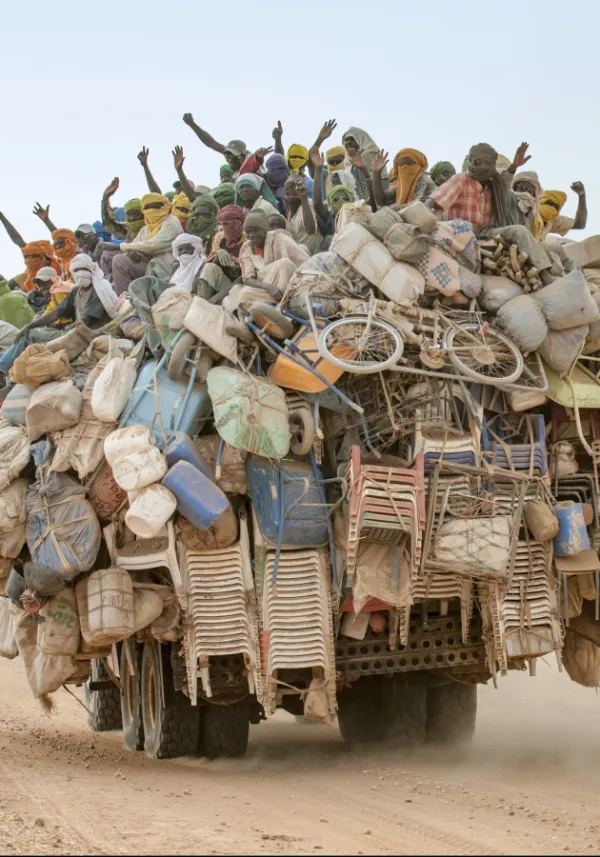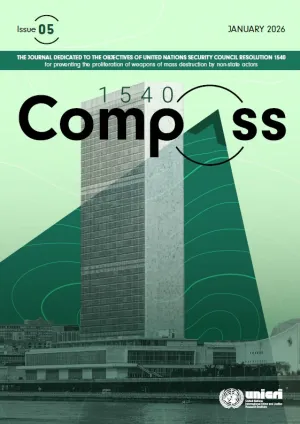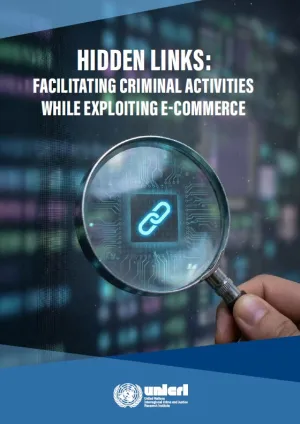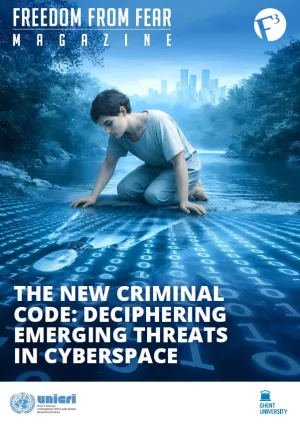
Across Africa, a growing threat looms: the intricate links between organized crime and terrorism. The nefarious interconnections between these phenomena jeopardize peace, security, and socio-economic development, undermining political stability and community resilience.
Terrorists can benefit from organized crime, whether domestic or transnational, through trafficking in arms, persons, drugs, cultural property, as well as the illicit trade in natural resources such as charcoal, timber, gold, or oil. They also misuse legitimate commercial enterprises, non-profit organizations, donations, and crowdfunding, and proceeds of criminal activity, including kidnapping for ransom, extortion, bank robbery, and transnational organized crime at sea. Additionally, emerging threats and trends can be observed in crimes conducted or facilitated through online activities or transactions. While terrorist organizations use organized crime as a source of funds and/or capitalize on the criminal experience of the individuals they recruit, criminal organizations can adopt terrorist techniques, tactic skills, and supply chains established by terrorist actors.
In regions like the Sahel, West Africa, and the Great Lakes, these dynamics are exacerbating humanitarian crises, poverty, and fragility.
UNICRI, with the support of the Ministry of Foreign Affairs and International Cooperation of Italy, has recently launched a new initiative to confront this challenge. Building on years of experience and expertise in this complex field, this project seeks to increase knowledge of how the nexus manifests across the African continent and to empower local, national, and regional stakeholders in preventing and fighting it. By addressing this multifaceted issue, activities will contribute to building resilient communities and bolstering regional security.
Comprehensive research will underpin this project, providing evidence-based analysis of how organized crime and terrorism interact across Africa. By identifying region-specific dynamics, this research will inform subsequent interventions tailored to local realities.
Key stakeholders in the most vulnerable areas and regions will be involved in awareness-raising activities to enhance local resilience and create opportunities for the development of synergies among relevant actors.
Civil society organisations will be involved in the design and delivery of initiatives tailored to the local needs and contexts, ensuring that interventions are locally effective and sustainable.
Criminal justice actors will receive specialized training to enhance their ability to recognize and counteract the nexus. This includes tailored Train-of-Trainers (ToT) sessions, equipping participants to transfer their knowledge to others.
Crime-Terror Nexus – Historical Overview and the Way Forward
The growing nexus between transnational organized crime and terrorism, and the confluence of tactics and resources arising from it, represents a threat to peace, security, and economic development.
Since 2016, UNICRI has been actively tackling the complex intersections between terrorism and transnational organized crime, with the purpose of:
- Assessing the nature and extent of the nexus at local, national and regional levels.
- Improving the skills of relevant stakeholders, including criminal justice actors and civil society representatives, to enhance prevention and enable more effective investigations and prosecutions, including through the use of forensic technological tools.
- Strengthening inter-agency cooperation at local, national and regional levels.
Between 2017 and 2018 UNICRI organized four regional meetings to raise awareness and gather data on the nexus:
- West Africa and the Sahel region, held in Algiers (October 2017), in collaboration with the Ministry of Foreign Affairs of Algeria.
- The Balkans, held in Tirana (February 2018), in collaboration with the Government of Albania, specifically the Coordination Centre for Countering Violent Extremism – Albania.
- Southeast and South Asia region, held in Singapore (March 2018), in collaboration with the International Criminal Police Organization (INTERPOL).
- Horn of Africa and East Africa region, held Nairobi (May 2018), in collaboration with the National Counter-Terrorism Centre (NCTC) of Kenya.
A diverse range of relevant stakeholders participated in the meetings, including representatives of various governmental agencies from countries within the region, representatives from international, regional, and national organizations, members of academia, the private sector, and representatives from civil society and non-governmental organizations. Building on the main findings, UNICRI, under the auspices of the Global Counterterrorism Forum (GCTF), developed “The Hague Good Practices on the Nexus between Transnational Organized Crime and Terrorism” (2018), a set of non-binding recommendations intended for international engagement, assistance, and training. These non-binding recommendations serve as a basis for international engagement, assistance, and training for Member States and interested stakeholders . The document was endorsed at the GCTF ministerial meeting in New York in September 2018 and presented at the Security Council Open briefing of the Counter-Terrorism Committee on “The Nexus Between International Terrorism and Transnational Organized Crime” in October 2018.
The recommendations were further operationalized by UNICRI in the dedicated “Policy Toolkit on The Hague Good Practices on the Nexus between Transnational Organized Crime and Terrorism” (2019). The toolkit has a twofold objective: (a) it provides a conceptual definition of the nexus, illustrating regional manifestations and identifying enabling factors to the nexus; and, (b) it provides Member States with practical guidance on implementing recommendations, where appropriate, by suggesting key actors to involve, while referencing relevant international standards and documentation, and highlighting example initiatives for specific recommendations.
The Policy Toolkit is available in the following languages:
Albanian
Arabic
English
French
Portuguese
Spanish
Good practices from the Policy Toolkit have been piloted in several Member States through a variety of capacity-building activities. The activities, carefully tailored to the context and involving dynamic scenario-setting exercises based on real cases, aim to stimulate open discussion among participants. Since 2019, UNICRI has trained hundreds of stakeholders on the nexus between organized crime and terrorism, including practitioners and policymakers from Albania, Algeria, Benin, Chad, Ghana, Kenya, Libya, Mali, Mauritania, Niger, and Togo. The capacity-building activities, guided by the Policy Toolkit, covered several topics relevant to the nexus, including inter-agency cooperation and legislative and operational aspects related to the effective prevention and prosecution of the nexus, as well as case studies through which participants could practice their skills and receive feedback from experts.
To improve knowledge and awareness of both the extent and consequences of the nexus between terrorism and organized crime, UNICRI has conducted research on various elements and perspectives, including manifestations of the nexus in Latin America, its impact on communities in Mali, and the intersections between cultural heritage smuggling and terrorism.
Africa has been particularly vulnerable to the linkages between terrorist and organized crime groups, with terrorism and violent extremism benefiting from organized crime through trafficking in arms, persons, drugs, and cultural property, as well as the illicit exploitation and trafficking of natural resources such as oil, precious metals, minerals, timber, charcoal, and wildlife. Other sources of financing include the abuse of legitimate commercial enterprise, non-profit organizations, external donations, crowdfunding, and proceeds of criminal activity, including kidnapping for ransom, extortion, bank robbery, as well as transnational organized crime at sea. Addressing these interlinked and destabilizing challenges is key to advancing the Secretary-General’s vision of alignment between peace and security, human rights, and development.
In 2023-2024, UNICRI and the United Nations Office on Drugs and Crime (UNODC), with the support of the United Nations Peace and Development Trust Fund (UNPDTF), Secretary-General’s Peace and Security Sub-Fund, implemented a comprehensive project aimed at analyzing trends and challenges in the beneficiary countries and regions; increasing awareness and enhancing the understanding of the nexus among criminal justice actors for more effective investigations; and ensuring that practitioners have access to the policies, skills, and tools needed to address the nexus and cooperate effectively.
Factsheet NEXUS Africa
Fiche d'information NEXUS Afrique
UNICRI is committed to advancing the understanding of the extent and impact of the nexus, with a special focus on its manifestations in the African content. A comprehensive report will be developed through primary and secondary research, including in-depth analysis of specific relevant topics, such as cultural heritage trafficking and drug trafficking, as well as context-specific vulnerabilities and protective factors.
In the Sahel, West Africa, and the Great Lakes, the link between terrorism and organized crime threatens peace, security, and development, weakening political stability and community resilience. To address this, UNICRI, with support from the Italian Ministry of Foreign Affairs and International Cooperation, has launched a new initiative to deepen understanding of this nexus and strengthen prevention efforts. Through research, the project will analyse how these threats interact across Africa, guiding targeted interventions. It will also engage key stakeholders in awareness-raising activities, involve civil society to ensure locally effective responses, and provide specialised training for criminal justice actors, equipping them to counter these challenges and share their expertise. By tackling this complex issue, the initiative aims to enhance regional security and strengthen community resilience.
UNICRI is committed to advancing research on the nexus between terrorism and organized crime, developing context-specific good practices and cooperation platforms, enhancing awareness and capacity building, and providing policy and technical guidance on available and effective strategies, tools, and mechanisms to prevent and counter this complex challenge.


